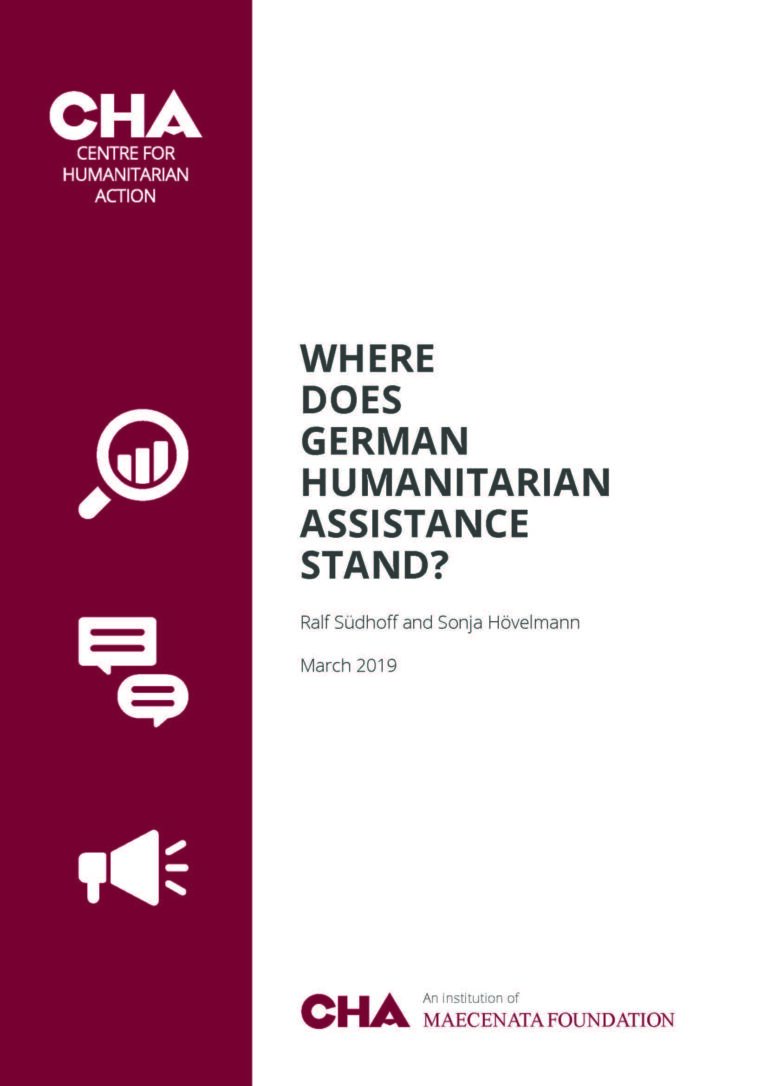| Author: | Ralf Südhoff and Sonja Hövelmann |
| Date: | 08.03.2019 |
| Downloads: |
Statement (DE) Statement (EN) |
The CHA has been appointed as an expert for a public hearing of the Federal German Parliament and its Committee on Human Rights and Humanitarian Aid. For the hearing CHA and other experts have submitted reviews of the German government’s humanitarian assistance since 2014 and its related report.
Germany has positioned itself as the second largest donor country, which is of extremely great value in times of a rapidly growing number of people in need. However, Germany’s financial engagement and its policy and strategy capacities have not grown at the same pace. Staffing as well as structural issues prevent Germany to fulfill its potential as a leading humanitarian actor.
Summary & Recommendations:
1. The Federal Government’s humanitarian aid has entered new dimensions at an impressive pace. This is extremely valuable in times of a rapidly growing number of people in need and a more than tenfold increase in the global need for humanitarian aid since the beginning of the 2000s.
2. Since the Cold War, the humanitarian system has rarely been viewed so critically, with humanitarian principles so disregarded and undermined as they are today. This makes it all the more important for a donor like Germany to use its resources in a principled, effective, strategic, and transparent manner and to assert its international influence in this direction. From the point of view of the CHA, there is both great progress and an acute need for action.
3. The conceptual, strategic, and personnel capacities of German humanitarian assistance were significantly expanded, but were unable to keep pace with the growth in financial resources and Germany’s new role. The setting of clear priorities in terms of content and personnel investments in the Federal Foreign Office and the embassies on the ground are necessary and urgent. In many cases, German aid organisations also continue to lack capacities and know-how in basic humanitarian assistance issues; the responsible Bundestag committee has neglected the issue to this day.
4. Relating to its own migration policy, Germany has placed a clear emphasis on the Syrian crisis in its humanitarian assistance. This mixture of humanitarian and political factors did not, however, lead to a demonstrably disproportionate promotion of the Syrian crisis in the light of global donor coordination. Smaller “forgotten crises“, remain a challenge for German humanitarian assistance, despite progress in their promotion.
5. A considerable stabilisation of the humanitarian assistance budget has been achieved. This should also be used to further increase planning scope and flexibility for partners through even more multi-year funding of programmes and less earmarked funds.
6. The share of humanitarian assistance in the total ODA budget of the Federal Government has increased but remains relatively low by international standards. In light of the dramatic increase in demand, the Federal Government should also consider shifting funds to humanitarian aid within the federal budget.
7. An important German priority should be to address the challenge of internationally shrinking space for humanitarian assistance. Germany has the potential to be an “honest broker,” which, however, is only partially exploited. In addition, capacities and commitment in areas such as “humanitarian diplomacy” seem capable of expansion.
8. Germany’s commitment to the defence of humanitarian assistance and its principles is inseparable from the Federal Government’s overall coherent policy on the humanitarian principles. This must be questioned, for example, with regard to Germany’s arms export policies in the context of humanitarian crises such as the one in Yemen or its policy regarding the rescue of shipwrecked persons in the Mediterranean Sea.
9. With respect to its humanitarian partners, the Federal Government’s judgements are based on the criterion of partners’ capabilities vs. their nationality or institution background (bi- / multilateral institutions). The increased allocations to flexible funds such as CERF and Country-based Pooled Funds should be further expanded.
10. The efforts to localise German assistance have shown great progress in quantitative terms, but should be clearly driven forward in qualitative terms by capacity building on the ground.
11. A change also in German humanitarian aid from an output to an outcome orientation seems necessary in order to better record and ensure its operational and strategic impact.
12. Increased impact analyses and evaluation capacities could allow the German government to develop more transparent, substantiated criteria for the allocation and evaluation of German humanitarian aid. They should form the basis of the Federal Government’s next report on humanitarian aid. More frequent reporting compared to the current four-year rhythm would be very welcome.
Please click here to read the full statement of the CHA. The other experts’ statements can be accessed here (in German).


